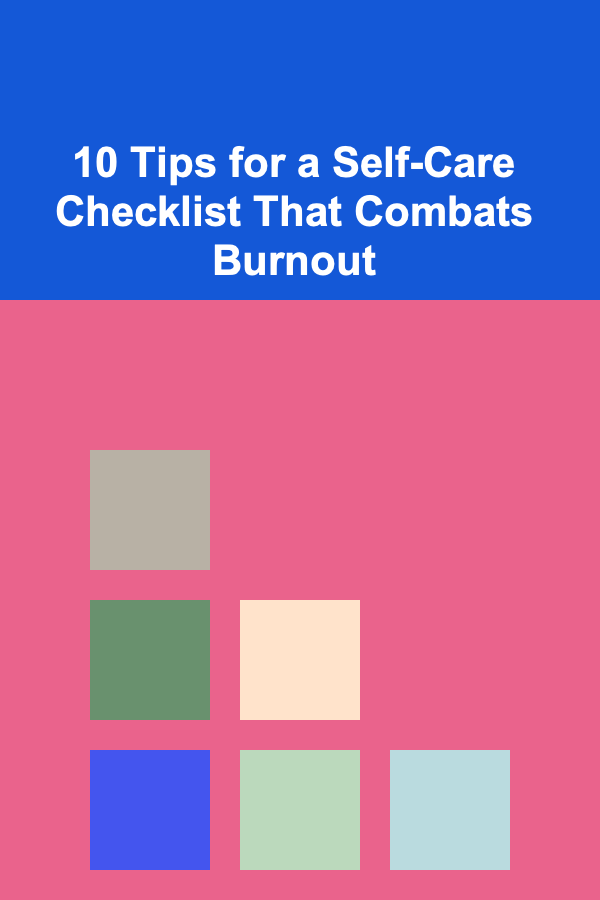
10 Tips for a Self-Care Checklist That Combats Burnout
ebook include PDF & Audio bundle (Micro Guide)
$12.99$11.99
Limited Time Offer! Order within the next:

In today's fast-paced world, the pressure to perform, succeed, and meet expectations can lead to burnout---a state of emotional, physical, and mental exhaustion caused by excessive and prolonged stress. Burnout can manifest in various ways, including fatigue, irritability, anxiety, and a feeling of being disconnected from the world around you. To counteract these negative effects, self-care is vital. But self-care isn't just about treating yourself to occasional indulgences; it's about creating habits and rituals that support your well-being on a daily basis. Here are 10 tips for a self-care checklist that can help combat burnout and restore balance in your life.
Prioritize Sleep
Sleep is essential for emotional and physical recovery, but many people, especially those in demanding work environments, sacrifice rest in the name of productivity. Chronic sleep deprivation not only impairs cognitive function but also increases stress and anxiety levels. If you're feeling burnt out, it's critical to prioritize your sleep. Aim for 7-9 hours of quality sleep each night.
Tips for better sleep:
- Establish a relaxing bedtime routine to signal to your body that it's time to wind down.
- Avoid screens (phones, laptops, etc.) for at least an hour before bed to minimize blue light exposure.
- Create a calming sleep environment, such as darkening the room, using earplugs or a white noise machine, and ensuring a comfortable mattress and pillow.
Set Boundaries
One of the biggest contributors to burnout is the inability to set healthy boundaries. Many people feel obligated to say "yes" to everything, whether it's work commitments, social obligations, or family responsibilities. Overextending yourself leads to stress and exhaustion, leaving you with little energy to care for yourself.
How to set boundaries:
- Learn to say "no" politely but firmly when you feel you can't take on additional responsibilities.
- Communicate your limits with colleagues, friends, and family members. Set expectations for your availability and stick to them.
- Block out personal time in your calendar, ensuring you have space for rest and relaxation.
Incorporate Movement and Exercise
Physical activity is an essential part of self-care because it helps reduce stress, improves mood, and increases energy levels. Regular exercise releases endorphins, the body's natural mood boosters, and can even improve your sleep quality.
Tips for incorporating movement:
- Find an activity you enjoy---whether it's walking, yoga, dancing, or going for a run---and aim to do it at least 3-4 times a week.
- Consider taking short breaks throughout the day to stretch, take a walk, or engage in a quick workout. Even a 10-minute burst of exercise can help clear your mind and lift your spirits.
- Practice mindful movement, like yoga or Tai Chi, to connect both body and mind.
Eat Nourishing Foods
Your diet plays a significant role in how you feel mentally and physically. A diet high in processed foods, sugar, and caffeine can contribute to fatigue, irritability, and emotional imbalances. On the other hand, nourishing your body with whole foods can provide steady energy, improve mood, and support mental clarity.
Nutritional tips for self-care:
- Prioritize balanced meals that include protein, healthy fats, and a variety of vegetables and fruits.
- Stay hydrated by drinking enough water throughout the day.
- Limit excessive caffeine and alcohol consumption, which can disrupt your sleep and contribute to stress.
Practice Mindfulness and Meditation
Mindfulness is the practice of being present in the moment without judgment, and it can be a powerful tool for combating burnout. Mindfulness techniques, such as meditation and deep breathing exercises, can reduce stress, improve focus, and enhance emotional regulation.
How to incorporate mindfulness:
- Dedicate 5-10 minutes each day to meditation or deep breathing exercises. Focus on your breath, and let go of racing thoughts.
- Practice mindfulness during daily activities such as eating, walking, or washing dishes. Focus on the sensory experience and let go of distractions.
- Use mindfulness apps or guided meditations if you're unsure where to begin.
Engage in Creative Hobbies
Engaging in creative activities can be incredibly healing for the mind and spirit. Whether it's painting, knitting, writing, or playing a musical instrument, expressing yourself creatively allows you to disconnect from stress and tap into a flow state where time seems to stand still.
Creative self-care ideas:
- Explore a hobby you've always wanted to try but never had time for, such as painting, photography, or gardening.
- Keep a journal where you write down your thoughts, dreams, or creative ideas.
- Set aside time for a creative project each week to help balance your work and personal life.
Socialize and Seek Support
Isolation can exacerbate feelings of burnout. Having a strong support network of friends, family, or colleagues who can offer encouragement and empathy is essential for your mental health. Socializing doesn't mean you need to attend large gatherings or parties---meaningful one-on-one connections can have just as much of an impact.
Social self-care tips:
- Schedule regular catch-ups with close friends or family members, either in person or virtually.
- Seek out professional support, such as therapy or coaching, if you're struggling to cope with stress or burnout.
- Join support groups or communities (online or offline) where you can share experiences and advice with like-minded individuals.
Unplug from Technology
Technology, while incredibly helpful, can also contribute to burnout. Constant notifications, emails, and social media updates can create a sense of overwhelm and make it difficult to disconnect. Taking regular breaks from technology helps you to refocus and recharge.
Tips for unplugging:
- Designate tech-free zones or times in your day, such as during meals or before bed.
- Set boundaries around checking emails or social media, and avoid the temptation to check your phone constantly.
- Engage in offline activities such as reading a book, going for a walk, or enjoying a hobby that doesn't require technology.
Practice Gratitude
Cultivating a gratitude practice can shift your mindset from one of stress and overwhelm to one of appreciation and positivity. Taking time each day to reflect on what you are grateful for can reduce anxiety, increase happiness, and provide perspective when you're feeling burnt out.
How to practice gratitude:
- Keep a gratitude journal where you write down three things you're grateful for each day.
- Express gratitude to others by sending thank-you notes or verbally acknowledging the people who support you.
- Reframe negative thoughts by focusing on what's going well, rather than what's causing stress.
Create a Healthy Work-Life Balance
Finding a healthy balance between work, personal time, and self-care is crucial in preventing burnout. When work takes up all of your time and energy, there's little room for relaxation or pursuing things that bring you joy.
Tips for maintaining work-life balance:
- Set clear working hours and stick to them. When the workday ends, allow yourself to fully disconnect and enjoy personal time.
- Delegate tasks at work when possible, and don't be afraid to ask for help.
- Incorporate regular breaks during your workday to rest and recharge, preventing mental and physical exhaustion.
Incorporating these self-care practices into your daily routine can make a significant difference in how you manage stress and prevent burnout. Remember, self-care is not a one-size-fits-all solution, and what works for one person may not work for another. The key is to find what brings you peace, joy, and balance, and prioritize it in your life. By nurturing your well-being and setting boundaries, you can build resilience against the pressures that lead to burnout and cultivate a more sustainable, fulfilling lifestyle.
Reading More From Our Other Websites
- [Home Cleaning 101] How to Clean and Care for Stainless Steel Appliances
- [Organization Tip 101] The Different Types of Textured Paint and Their Uses
- [Whitewater Rafting Tip 101] Choosing the Perfect Rafting Helmet: A Comprehensive Buying Guide
- [Personal Investment 101] The Top Ways to Make Money with Deep Learning Models and Algorithms
- [Tie-Dyeing Tip 101] Sustainable Style: Eco‑Friendly Materials for Stunning Stripe Tie‑Dye Projects
- [Home Staging 101] How to Stage a Kitchen Island: Accessorize and Declutter Like a Pro
- [Organization Tip 101] How to Make Donations in Memory of Loved Ones
- [Screen Printing Tip 101] Step-by-Step: How to Create Custom Stencils for Perfect Prints
- [Home Family Activity 101] How to Set Up a Backyard Obstacle Course for Family Fun
- [Home Pet Care 101] How to Build an Outdoor Catio on a Budget: Creative and Affordable Solutions for Providing Safe Outdoor Access

How to Decorate Your Home on a Tight Budget
Read More
How to Set Up a Checklist for Following Up After a Business Presentation
Read More
How To Patch and Repair Concrete
Read More
How to Choose Sustainable and Ethical Food Sources
Read More
How To Train Your Brain to Be More Resilient
Read More
10 Tips for Improving Your Lock Picking Speed
Read MoreOther Products

How to Decorate Your Home on a Tight Budget
Read More
How to Set Up a Checklist for Following Up After a Business Presentation
Read More
How To Patch and Repair Concrete
Read More
How to Choose Sustainable and Ethical Food Sources
Read More
How To Train Your Brain to Be More Resilient
Read More